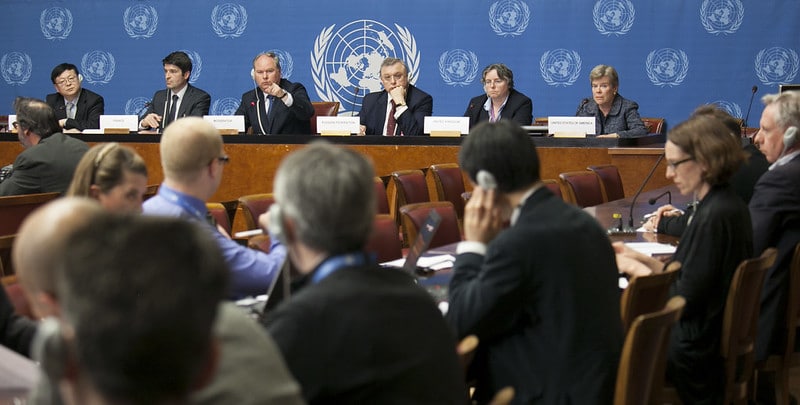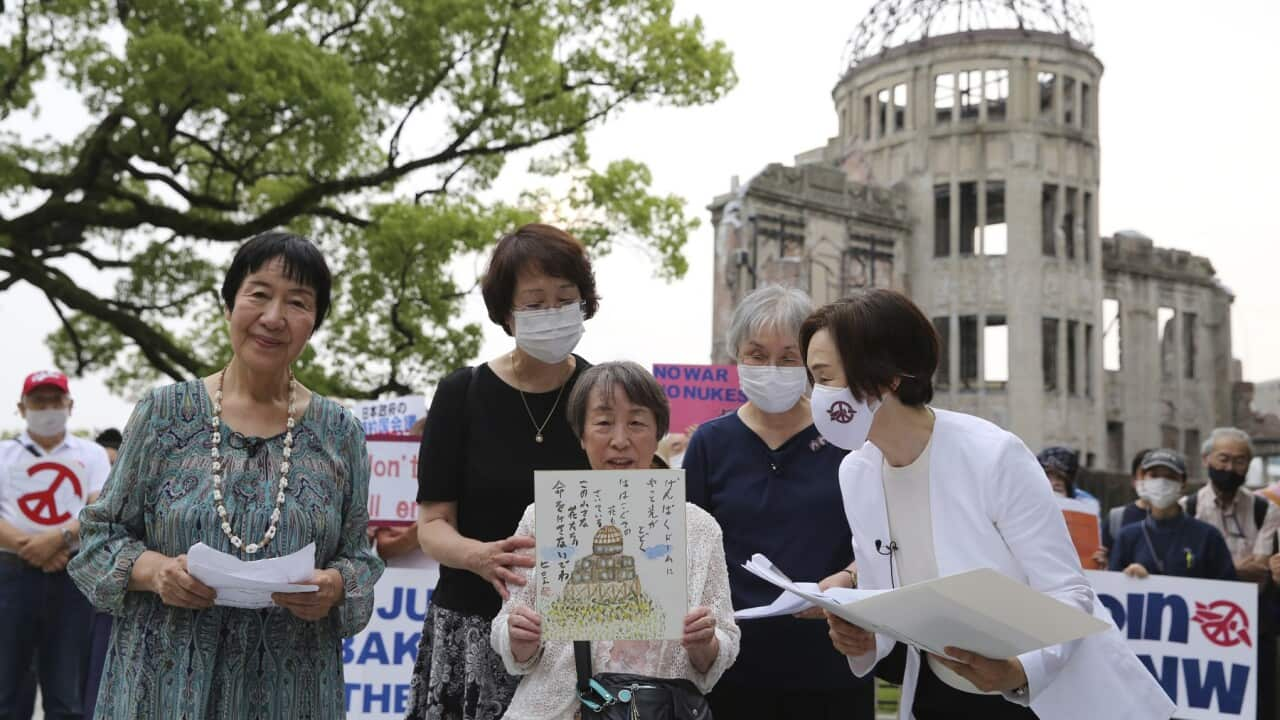
First UN Nuclear Ban Treaty Meeting Urges “Immediate Action”
Kyodo News
VIENNA (June 23, 2022) — Parties to a UN treaty banning nuclear weapons called for “immediate action” to achieve a nuclear-weapons-free world as they wrapped up their first meeting Thursday.
The statement, adopted at the end of the three-day meeting of parties to the Treaty on the Prohibition of Nuclear Weapons in Vienna, said a prompt response is the only way for such weapons to never be used again at a time when Russia is threatening to use them in its war against Ukraine.
Nuclear threats “further underscore the enormity of the danger posed by the existence of nuclear weapons,” according to the Vienna Declaration.
The statement expressed grave concern that nine countries — Britain, China, France, India, Israel, North Korea, Pakistan, Russia and the United States — possess a total of around 13,000 nuclear weapons and insisted that “nuclear-armed states never use or threaten to use nuclear weapons under any circumstances.”
Their concern comes as Russian President Vladimir Putin has ordered the country’s nuclear forces on high alert in its aggression against Ukraine.
Also in the statement, the parties, including 65 countries and regions that have ratified the treaty, criticized countries under the nuclear umbrella of nuclear-weapons states, such as Japan, for not taking “any serious steps to reduce their reliance on nuclear weapons.”
The parties will accelerate the implementation of the treaty “with the aim of further stigmatizing and de-legitimizing nuclear weapons and steadily building a robust global peremptory norm against them,” the declaration said.
Japan, the only country in the world to have experienced the horrors of nuclear weapons in war, has not signed the nuclear weapons ban treaty and did not join the meeting, even as an observer, despite high expectations among survivors of the Hiroshima and Nagasaki bombings that it would.
Germany, Norway and the Netherlands participated in the meeting with observer status although their national defense depends on the US-led nuclear umbrella as members of the North Atlantic Treaty Organization.
Sweden and Finland, which have applied to join NATO in the wake of Russia’s invasion of Ukraine, as well as Australia, a key US ally just like Japan, were also among observer participants.
The participants hailed “valuable contribution to taking forward nuclear disarmament” by entities and people, including “hibakusha” or survivors and others who have been physically affected by nuclear radiation.
The nuclear-armed states, which are allowed to possess the weapons under the Treaty on the Non-Proliferation of Nuclear Weapons or NPT, are against the nuclear weapons ban treaty.
The ban treaty is the first international pact outlawing nuclear weapons development, testing, possession and use. The first meeting was held to build momentum for abolishing the ultimate weapons of war.
Friction remains between non-nuclear countries that support the nuclear ban treaty and nuclear-weapon states. The ban treaty will work constructively with the NPT, as it recognizes the NPT as the “cornerstone of the disarmament and nonproliferation regime,” according to the declaration.
First Meeting of States Parties
To the Treaty on Nuclear weapons
Germany’s Goal: A Nuclear-free World
Russia’s war of aggression against Ukraine has shown that credible deterrence and defence are necessary to safeguard our security in Europe.
At the same time, the Federal Government is committed to the goal of a world without nuclear weapons and thus also a Germany without nuclear weapons. On the path towards this goal we urgently need new impetus for nuclear disarmament. The Federal Government intends to assume a leading role in this area.
For Germany, the central framework for action in the field of nuclear disarmament and non-proliferation remains the Nuclear Non-Proliferation Treaty (NPT), which almost all countries in the world have joined. In the context of the Stockholm Initiative Germany, in cooperation with partners, has developed concrete proposals to strengthen the NPT and thereby opened up a way to make the world safer from nuclear weapons.
The Meeting of States Parties to the TPNW
Another forum for exchange on this common goal is the Meeting of States Parties to the Treaty on the Prohibition of Nuclear Weapons (TPNW).
The TPNW entered into force on 22 January 2021, after having been ratified by more than 50 states. To date, 86 states have signed the Treaty and 62 have ratified it (a list of the States Parties to the Treaty is available here). The first Meeting of States Parties is taking place in Vienna from 21 to 23 June.
The Treaty on the Prohibition of Nuclear Weapons prohibits, among other things, the deployment, possession and transit, storage and stationing of nuclear weapons.
These extensive prohibitions create a conflict of interests between the TPNW and the responsibilities that the NATO allies have assumed. For this reason neither Germany nor other NATO members have joined the TPNW.

Shared Concern about Lack of Disarmament
However, the Federal Government shares the concern of the States Parties to the TPNW about the lack of progress in the area of nuclear disarmament. Like several other allies and close partners, the Federal Government has therefore decided to participate in the first Meeting of States Parties to the TPNW as an observer.
The Federal Government intends to continue dialogue with the States Parties to the TPNW on the question of how further progress on nuclear disarmament can be made in the current security environment.
The German delegation in Vienna will be headed by Ambassador Rüdiger Bohn, Deputy Federal Government Commissioner for Disarmament and Arms Control at the Federal Foreign Office.
Foreign Minister Baerbock stated the following at the event to launch the development of a National Security Strategy in Berlin on 18 March:
I would like us to hold an honest debate on how we can create the conditions necessary for steps towards disarmament. This cannot be done by making unilateral demands of our western partners within the Alliance. Genuine progress towards disarmament can only be achieved when all nuclear weapon states take credible steps. And we also know – this is what makes the current situation so terrible – that Putin is now doing precisely the opposite, is threatening to use nuclear weapons.
Nevertheless, we stand on the side of international law. That is a position of strength. And so it is clear to us, and this will be embedded in our National Security Strategy, that disarmament and arms control remain an essential component of our security. We must understand disarmament and arms control as being complementary to deterrence and defence.
Related Coverage:
First UN nuke ban treaty action plan to vow to help affected states
